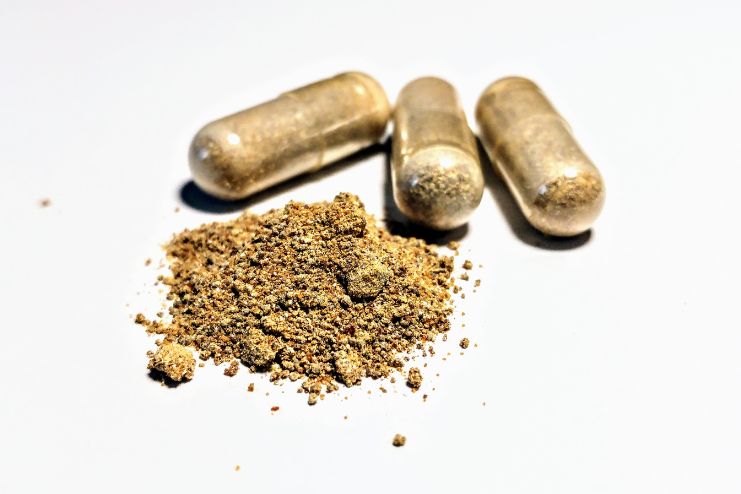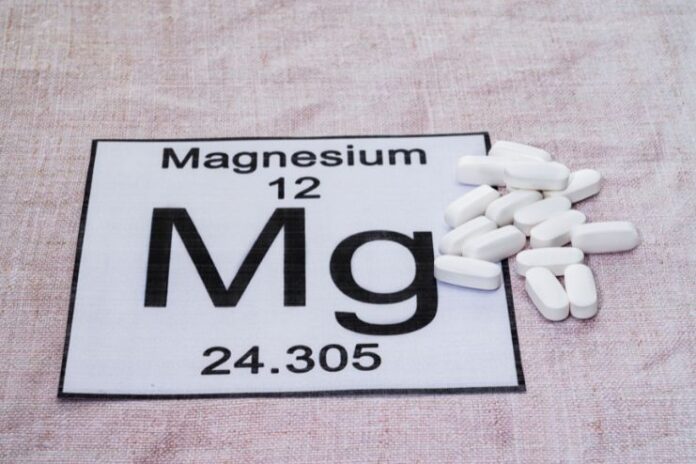Affiliate Disclaimer
Some links in this article are affiliate links. We may earn a small commission if you make a purchase through these links, at no extra cost to you. We only recommend products we find useful to our readersTired of tossing and turning at night, only to wake up groggy and unrested? You’re not alone. Sleep issues affect nearly 50-70 million Americans, with stress, overstimulation, and nutrient deficiencies being common culprits. But what if a quiet mineral deficiency is silently sabotaging your nights?
Meet magnesium glycinate—a soothing, bioavailable form of magnesium that can be the key to unlocking your evening relaxation routine. Praise is one of the best magnesium supplements for sleep; it soothes your mind, relaxes muscles, and enhances restorative sleep cycles—naturally.
Read More: 22 Helpful Magnesium Benefits For Health That Will Blow Your Mind
What is Magnesium Glycinate?

Magnesium glycinate is one form of magnesium complexed to the amino acid glycine. Chelation of this structure in the form that it’s readily absorbed by the body over the other forms of magnesium, like magnesium oxide or sulfate, that are very poorly absorbed and lead to digestive discomfort.
This chelated state makes it much more bioavailable and stomach-friendly than others, such as:
- Magnesium oxide: Prevalent, but only ~4% is absorbed.
- Magnesium citrate: Better absorbed but can cause loose stools.
- Magnesium glycinate: Very absorbable and soothing.
Why glycine matters: Glycine is a soothing amino acid that enhances sleep quality by enhancing core body temperature control and encouraging more intense REM cycles. Combined with magnesium, it improves the relaxing effects—making magnesium glycinate a two-in-one natural sleep aid supplement.
How Magnesium Glycinate Supports Deeper Sleep

Here’s how magnesium glycinate helps you sleep better:
- Calms the Nervous System & Reduces Stress:
Magnesium is crucial in regulating the HPA axis (hypothalamic-pituitary-adrenal axis), your body’s master stress response system. Magnesium deficiency is associated with high cortisol and poor tolerance to stress, which impacts your ability to stay asleep. Magnesium dampens the excitatory NMDA receptors, allowing the brain to relax. It reduces evening cortisol, the stress hormone usually to blame for 2 a.m. awakenings.
- Boosts GABA Production for Relaxation:
GABA (gamma-aminobutyric acid) is the brain’s primary inhibitory neurotransmitter. It promotes relaxation by dampening neural excitability. Magnesium is a co-factor in GABA production, and deficiency can compromise GABA function, resulting in racing thoughts, restlessness, and insomnia.
Read More: Magnesium Deficiency: The Silent Problem You Didn’t Know You Had (And How to Fix It)
Low GABA = high anxiety and poor sleep latency.
Magnesium glycinate promotes GABA levels while reducing anxiety and overthinking at night.
- Improves Sleep Onset & Reduces Sleep Latency:

Magnesium reduced sleep latency (the duration required to fall asleep). A double-blind, placebo-controlled trial concluded that older participants who received magnesium supplements had enhanced sleep duration and fewer early morning awakenings.
It also affects melatonin production, the hormone that controls your circadian rhythm. Magnesium is needed to turn serotonin into melatonin, vital for controlling your sleep-wake cycle.
- Increases Deep Sleep (Slow-Wave Sleep / NREM):
Slow-wave sleep, or NREM deep sleep, is the phase in which cellular repair, detoxification, and memory consolidation occur. Magnesium serves to prolong this phase by:
- Relaxing the central nervous system.
- Decreasing muscle tension and preventing sleep fragmentation.
Chronic magnesium deficiency and poor sleep go hand in hand, usually leading to light, disturbed sleep.
- Prevents Nocturnal Muscle Cramps & Restless Legs:
Magnesium calms muscle fibers by balancing calcium activity at the neuromuscular junction.
Low magnesium levels can cause:
- Restless Leg Syndrome (RLS).
- Nocturnal leg cramps.
- Twitching or tension during sleep.
Magnesium glycinate ensures optimal muscle function, preventing sleep disturbance caused by movement disorders.
- Regulates Blood Sugar & Eases Nighttime Cortisol Surges:
Unstable blood sugar at night can cause cortisol surges, jolting you awake. Magnesium is key to glucose and insulin sensitivity and assists in:
- Regulating nighttime hypoglycemia.
- Decreasing arousals caused by cortisol.
So, magnesium is especially beneficial for those who wake up stressed or hungry in the dead of night.
Read More: The Sleep Myth That’s Ruining Your Rest – Why 8 Hours Isn’t for Everyone
Signs of Magnesium Deficiency That Could Be Ruining Your Sleep
You may not even realize you’re low in magnesium—until your sleep begins to suffer. Red flags are common; these include:
- Trouble falling or remaining asleep.
- Night-waking or light sleeping frequently.
- Muscle twitching, cramps, or restless legs.
- Anxiety, irritability, or restlessness at night.
- Daytime lethargy or mental fogginess.
- Irregular heartbeat or high blood pressure.
As many as 50% of Americans fall short of the RDA for magnesium, making it an insomnia silent partner.
Best Ways to Take Magnesium Glycinate for Sleep
Ideal Dosage for Sleep Benefits
- A normal dose to support sleep is between 200 and 400 mg of elemental magnesium daily.
- Always read the elemental magnesium content, not merely the total weight of the compound.
- Begin at the lower end and gradually adjust, particularly if you’re a newcomer to supplementation.
Warning: Increased doses can lead to loose stools, particularly if taken with other forms such as citrate or oxide.
Here are some of the popular Magnesium Glycinate supplements available online. The top picks include:
- NATURELO Magnesium Glycinate Chelate Complex
- Nature Made Magnesium Glycinate 200 mg per Serving, Magnesium Supplement
- 90 CT Magnesium Glycinate Gummies
Best Time to Take It
- 30–60 minutes before sleep is best for relaxation and sleep onset.
- Having it with a light snack could favor absorption and minimize any minor digestive upset.
How to Choose a High-Quality Magnesium Supplement

Here’s how to choose the best and highest-quality magnesium supplement for maximum effectiveness:
You must look for:
- Pure magnesium glycinate (sometimes listed as magnesium bisglycinate).
- No fillers, stearates, or dyes.
- Companies that conduct third-party purity and potency testing.
Try to avoid:
- Magnesium oxide is less bioavailable and is commonly found in low-end products.
Combining Magnesium with Other Sleep-Conducive Nutrients

You can stack magnesium glycinate with other relaxing compounds to have synergistic benefits:
- Glycine, already in magnesium glycinate, supports REM cycles and reduces core body temp.
- L-theanine helps promote alpha brain waves and dampens mental chatter.
- Melatonin is beneficial if your circadian rhythm is upset (e.g., shift work or jet lag).
- Ashwagandha is an adaptogen that reduces cortisol and enhances stress resilience.
Check out popular ashwagandha supplements here.
Potential Side Effects & Who Should Avoid Magnesium Glycinate

Magnesium glycinate is usually well tolerated, but you must keep certain things in mind:
- Mild diarrhea or GI upset at high doses (rare with glycinate, more likely with citrate or oxide).
- Individuals with kidney disease need to talk with a healthcare professional before supplementing.
- Potential interactions with blood pressure medications or diuretics. Talk to your doctor before you start these.
Overdose of magnesium is rare, but signs include low blood pressure, confusion, and decreased breathing. Be careful with dosages.
Read More: Understanding REM Sleep: Why It’s Critical for Brain Health
Final Thoughts

If you’ve been looking for a natural sleep aid supplement that works, consider using magnesium glycinate. This helps you sleep better and could be the game-changer in your sleep regimen you didn’t know you needed. Science-backed and easy on the body, it supports everything from GABA production to muscle relaxation, melatonin synthesis, and stress reduction.
Rather than masking symptoms with sedatives, magnesium glycinate addresses the underlying biochemical imbalances that interfere with sleep. It’s an effective, low-risk way to increase deep sleep naturally, regulate your circadian rhythm, and finally wake up feeling restored.
References
- https://www.ncbi.nlm.nih.gov/books/NBK19961/
- https://www.healthspan.co.uk/magnesium-glycinate/
- https://www.ncbi.nlm.nih.gov/books/NBK519495/
- https://www.ncbi.nlm.nih.gov/books/NBK526124/
- https://pmc.ncbi.nlm.nih.gov/articles/PMC3703169/
- https://www.ncbi.nlm.nih.gov/books/NBK526132/
- https://www.webmd.com/vitamins/ai/ingredientmono-998/magnesium
- https://www.joinmidi.com/post/magnesium-for-sleep
In this Article





















